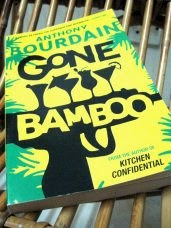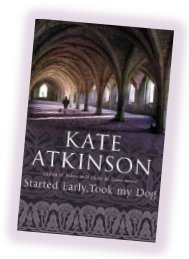Take a gander at these teasers for Amish Tripathi's Shiva Trilogy. And here are some teasers for The Secret History of Elizabeth Tudor, Vampire Slayer. How about this nifty video for Scott Westerfeld's Girl Genius-like Leviathan?
Compare these with the promotional videos for the next big sleep-killing app of the year. Aren't they all kind of ... elaborate for what are book previews? And don't you think Blizzard Entertainment should totally go into movies, instead of pretending to be a games company?
Author AJ Walkley, for one, appears to like the idea of a book trailer. For her, it's one more way of selling a book, and she can get her videographer and musician friends to help her make it, preferably at lower cost and, ideally, at much higher production values.
Walkley cites another author, Rex Pickett, who makes the case for book trailers with culture. Good short videos nab attention, as they should in an age where everything is getting more and more visual, and a book or series with its own trailers tend to stand out from the rest.
Showpiece or showboating?
Of course, there's a tendency to overproduce a book trailer, which in turn may foster unrealistic expectations for the book later on. And, well... book trailers don't quite showcase the actual product, which is mostly text. Many responses to some of the book trailer videos I've seen have called for a film adaptation to be made.
"Trailers for movies make sense — a visual medium for a visual product," Walkley says. "If you aim to read a book, why do you need anything more than the synopsis of the book before you know whether you want to read it?"
A commenter who claims to be "one of the pioneers of book trailer production" makes several good points about video as another medium on the Web and the proper approach to book trailers. I broke up the latter half into more paragraphs:
I understand your impulse to over produce your book trailer but in doing so you run the risk (as you learned) of misrepresenting the experience. My approach is generally — less is more.
As a producer I do not want to substitute my images for the images that the reader will conger themselves. I want to use video to suggest the experience that the book promises. The trailer should not interfere with the relationship between the author's words and the imagination of the reader. Whenever possible I like to draw from the book's cover and any illustrations the book might have. Beyond that the images should be suggestive and not explicit.
I don't think trailers can convince me to buy a book. It was, however, the visually arresting previews of Tripathi's books that got my attention. This was how I'd learnt of the trilogy's existence, though you'd need to watch each video to see that, oh, they're pitching a book and not a film or a video game.
But I think some parts need more research. From the trailer for the second book in Tripathi's Shiva trilogy, Secret of the Nagas, segment 0:23:

Is that a European-style longsword in ancient India? And what's the
Dark Wanderer from Diablo doing there?
Dark Wanderer from Diablo doing there?
With books going digital, a book trailer might make more sense if it's embedded in the e-book itself as a preview for an author's next book or, if the book is part of a series, the next volume. Not too different from the preview chapters at the back of printed books.
Let it be good
I can imagine the kinds of other video previews that could go into the last few 'pages' of an e-book: author notes, spoken by the author himself/herself; promotional skits, outtakes, maybe ads (though I wish there wouldn't be). Maybe a link somewhere where they can open a page and write an Amazon review and put it up, or post their thoughts immediately on Goodreads, Facebook or Twitter. Maybe, on some kind of Foursquare-ish app for books, an automatically updated status.
Collaborative efforts in producing book trailers, such as in Walkley's, would also mean more work for other indie film, digital animation and music sectors. The book trailer in this case becomes a showcase of the moviemaker and musician's respective talents.
But let's have creative, good-quality video content, please. Blurb- and back cover copy-writing may fade away with print, but the need for quality is a constant. And what matters most is the book itself.
Categories:
Book Blab



